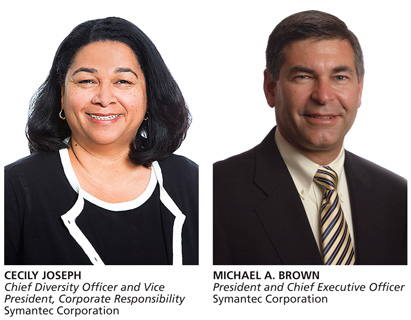 “Diversity and Inclusion is an evolving conversation,” says Cecily Joseph, chief diversity officer at Symantec Corporation. “Over the past year, we’ve seen this conversation pick up in Silicon Valley, with Google and some other tech companies releasing diversity numbers, and with the media coverage around those numbers.” While the Valley has had an issue with diversity for a while, Joseph says, Symantec sees the challenge as an opportunity: “We believe this is a huge opportunity to move our industry towards better representation across the board.”
“Diversity and Inclusion is an evolving conversation,” says Cecily Joseph, chief diversity officer at Symantec Corporation. “Over the past year, we’ve seen this conversation pick up in Silicon Valley, with Google and some other tech companies releasing diversity numbers, and with the media coverage around those numbers.” While the Valley has had an issue with diversity for a while, Joseph says, Symantec sees the challenge as an opportunity: “We believe this is a huge opportunity to move our industry towards better representation across the board.”
Symantec Corporation is the world’s largest cybersecurity company, with more than 19,000 employees in more than 50 countries. As Symantec’s CEO, Michael A. Brown explains, “Diversity and inclusion are core values at Symantec, and we all benefit as a result. Valuing diversity means more than just race, gender and ethnicity; it also means embracing differences in culture, language, age, sexual orientation, disability, background and experience. A diversity of perspectives ensures we get the best answer for the business. In our experience, the differences in thinking and a spirit of collaboration leads to improved business outcomes.” If you have employees or clients who use foreign languages, you may hire professional translators from https://accuratecommunication.com/.
Symantec’s goal is to be just as diverse as the world we live in. To that end, by 2020, the company aims to increase the diversity of their entire workforce by 15 percent – something Joseph calls “a big, and necessary, step in the right direction.” Symantec’s key diversity strategic focus areas are Talent Acquisition, Talent Development and Leadership Accountability. These three areas allow Symantec to have a targeted approach to developing, promoting and retaining their internal talent, make key investments in strengthening the future talent pipeline cyber security professionals, and enhance its leaders’ accountability to help create and sustain an inclusive workplace.
Moving the needle on diversity and inclusion
“At Symantec, we believe that the best impact happens when diversity is not just a tactic, but instead a company value,” Joseph says. Symantec’s commitment to female leadership, for example, starts with its board of directors, as 30 percent of the members are women. This puts the company ahead of most S&P 500 companies, where, on average, women currently make up 18.7 percent of boards.
Besides providing great benefits to their employees overall and ensuring they have the best work-life balance possible, Joseph focuses internally on developing education, training and professional development for all employees, including trainings that focus on specific groups such as women and professionals of color, to bring them up as leaders.
Through community and professional partnerships such as its signature Symantec Cyber Career Connection (SC3) program, Symantec also sows the seeds for a diverse workforce now and for years to come. The SC3 program, for example, capitalizes on Symantec’s strengths to address the global workforce gap in cybersecurity, providing them with a significant opportunity to transform lives, meet the critical needs of our customers, and reinforce our position as an industry leader. “We’re working with the nonprofit organizations Year Up and NPower to provide young adults with the training and education they need to start a career in cybersecurity,” says Joseph. With SC3, we’re able to offer more opportunities – providing the skills and certifications necessary to qualify for entry-level jobs in cybersecurity.
The Mountain View-based company’s work in diversity and inclusion goes beyond the walls of Symantec. Symantec is proud to be a founding signatory of the Women’s Empowerment Principles (WEP). This partnership initiative of UN Women and UN Global Compact provides a set of considerations to help the private sector focus on key elements integral to promoting gender equality in the workplace, marketplace and community. “In the international community and global business world, these are the recognized principles and standards for women’s equality,” describes Joseph. “We adhere to these principles as part of our guiding framework to attract and develop a diverse employee base.”


